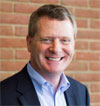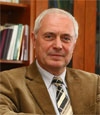Digitalisation and Industry 4.0 will change how people work, the way students learn and what they are taught. Besides the latest technological achievements it is more important to focus on skills such as cooperation, teamwork and knowledge sharing. Universities also need to keep pace with the changes, so that their graduates will be able to find fulfilling employment, with multinationals and SMEs alike. A 'new level of partnership' is emerging between academic institutions and business to create the foundation for long-term success.
In his presentation, Mr. Martin will highlight the qualifications sought-after on the labour market and demonstrate through practical examples how companies can collaborate with universities to achieve mutual benefits.
 Dale A. Martin was born in Pennsylvania in 1957 and graduated from the University of Economics and Business Administration in Vienna, Austria (1984), having read Management & Organization and Export Marketing. Prior to this, he had studied Mandarin Chinese in Taiwan and spent a semester in Angers, France.
Dale A. Martin was born in Pennsylvania in 1957 and graduated from the University of Economics and Business Administration in Vienna, Austria (1984), having read Management & Organization and Export Marketing. Prior to this, he had studied Mandarin Chinese in Taiwan and spent a semester in Angers, France.
Dale A. Martin began his professional career with AWT International Trade and Finance Corporation in Vienna in 1984, responsible for the Hungarian market; subsequently he was named deputy general manager for AWT Services, on secondment in Hong Kong. He joined Siemens in 1991, moving back to Europe as the CFO of the Siemens Telecommunications in Hungary. Later he became CFO of Siemens Hungary and, concurrently, CFO of Hungarian Cable Works.
In 2000 he was appointed CFO of Siemens Healthcare Japan, relocating to the Asian continent once more. Thereafter, in 2004 he took up the post of CFO of Siemens Slovakia. Accepting his current position in 2010, he had returned to Hungary.
He was elected President of the German-Hungarian Chamber of Industry and Commerce (DUIHK) in May 2013.
In this session, Dr. Milligan will discuss ABET's role in helping shape the global technical professional of tomorrow. He will provide his views on some of the unique challenges facing future engineering education, and will provide insights into ABET's expanding international engagement. He'll also share his thoughts on learning in a collaborative/teaming environment and how the incorporation of these methods into a student's academic program potentially impact the future global workforce.
 Michael K. J. Milligan is Executive Director and CEO of ABET, a nonprofit organization that accredits nearly 3,700 college and university programs in the disciplines of applied science, computing, engineering, and engineering technology located in 30 countries. In this role, Milligan leads a full-time staff headquartered in Baltimore supporting the operations of over 2,200 accreditation Experts. Milligan is responsible for all aspects of ABET’s global operations and reports directly to the Board of Directors.
Michael K. J. Milligan is Executive Director and CEO of ABET, a nonprofit organization that accredits nearly 3,700 college and university programs in the disciplines of applied science, computing, engineering, and engineering technology located in 30 countries. In this role, Milligan leads a full-time staff headquartered in Baltimore supporting the operations of over 2,200 accreditation Experts. Milligan is responsible for all aspects of ABET’s global operations and reports directly to the Board of Directors.
Prior to joining ABET, Milligan worked for the Aerospace Corporation developing a new generation environmental satellite for the National Oceanic and Atmospheric
Administration (NOAA). He also served 24 years as a career U.S. Air Force officer working in the areas of operations, international research & development, and technology acquisition. He served six years as an associate professor and Deputy Department Head in the Department of Electrical and Computer Engineering at the U.S. Air Force Academy, in Colorado. Milligan earned a Ph.D. from The University of Texas at Austin, an M.S.E. from the University of Massachusetts at Lowell, and a B.S. from Michigan State University - all in electrical engineering. He also earned an M.B.A. from Western New England College, Springfield, MA and is a Certified Association Executive (CAE). Milligan is a senior member of the Institute of Electrical and Electronics Engineers (IEEE), a member of the Tau Beta Pi Engineering Honor Society, and a registered professional engineer in Colorado and Maryland. He lives in Severna Park, Maryland, with his engineer wife and their two sons.
The lecture includes three messages. In Hungary, the world of work and education has been undergoing a very deep change during the latest decades. The transformation of the labour market, especially after the millenary, made it rather clear that the traditional systems of professional qualification were no longer able to shape the system of employment. There is a transformation turn going on in VET, the old structures are no more able to respond to the new challenges. He wishes to direct the attention to the possibility of opening up the structures, highlighting the VET potentials hiding in the application of open systems. The open access principle, which was taken over from the information systems and is typical in the up-to-date library publication services, may provide considerable help in involvement of students into the management and development of VET content, which can be an especially important motivation and development factor. Their researches conducted during the latest decade have clearly proved the fact that by applying co-operative learning methods, digital online content development can be utilized in the renewal of the education resources, as well. Finally, he would like to highlight the fact that one possible characteristic of the transformation turn in VET is that we start using images more intensively than ever before. In fact, we have to utilize the info-communication potential that is always and everywhere available as for VET students, and could be extremely useful in case we are creative and methodologically prepared.
 He is electrical engineer and engineer teacher. From 1976 to 1979 he studied systems analysis with scholarship and acquired a PhD at the Academy of Pedagogical Sciences in Moscow. During the 1980s he was a scientific advisor for the Hungarian Academy of Sciences. He was the Director of Vocational Training (from 1984 to 1989), then Director General (from 1989 to 1990) at the National Pedagogical Institute. As first Director General in 1990, he established the National Institute of Vocational Education. He was involved in several UNESCO and ILO projects and participated in preparation of various World Bank and Phare projects in the area of human resource development. From 1991 to 2006 he was in position of deputy and permanent state secretary in different ministries: Ministry of Labour, Ministry of Education and Ministry of Culture. His main fields of research are the theory of learning, the history and development of vocational qualifications, the impact of new technologies on visual and mobile learning and teaching.
He is electrical engineer and engineer teacher. From 1976 to 1979 he studied systems analysis with scholarship and acquired a PhD at the Academy of Pedagogical Sciences in Moscow. During the 1980s he was a scientific advisor for the Hungarian Academy of Sciences. He was the Director of Vocational Training (from 1984 to 1989), then Director General (from 1989 to 1990) at the National Pedagogical Institute. As first Director General in 1990, he established the National Institute of Vocational Education. He was involved in several UNESCO and ILO projects and participated in preparation of various World Bank and Phare projects in the area of human resource development. From 1991 to 2006 he was in position of deputy and permanent state secretary in different ministries: Ministry of Labour, Ministry of Education and Ministry of Culture. His main fields of research are the theory of learning, the history and development of vocational qualifications, the impact of new technologies on visual and mobile learning and teaching.
The readySTEMgo-project aims to improve the retention rates of higher education STEM programmes by focusing on the academic readiness of incoming students. We intend to identify those students with an increased propensity of dropping out in an early stage of the chosen STEM programme. To achieve this goal, we identified the key STEM competencies that are required to be successful in a STEM study programme and we selected diagnostic tests to identify students at risk.
Students’ course-taking and math and science GPA in secondary school are the most consistent predictors, as proven already in many other studies. Additionally, the results of this project indicate that some self-regulatory skills are also among the prime indicators for underperformance in the first year of a science and engineering programme. And an important conclusion is that the secondary school teacher board can judge the capabilities of their students with a high predictive value. This calls for a closer collaboration between universities and secondary schools in counselling students during their decision-making processes.
The presentation will discuss the predictors in more detail and give an overview of some interventions currently running at the European partner universities of the project.
 Greet Langie holds a MSc- and PhD-degree in Physics from the University of Leuven (Belgium). From 2012 until now she’s the vice dean of the Faculty of Engineering Technology (KU Leuven, Belgium). She is the founding chair of LESEC (Leuven Engineering and Science Education Center, http://set.kuleuven.be/LESEC), a research center focusing on applied educational research in engineering and science HE-programmes. Her recent research activities focus on key skills of incoming students in STEM education, possible intervention initiatives and the training of students in order to reduce the skills mismatch in the professional field of engineering. She's the project coordinator of the Erasmus+ Strategic Partnership 'readySTEMgo' in which she focuses on early identification of STEM readiness and on targeted academic interventions (see http://iiw.kuleuven.be/english/readystemgo), and the Erasmus+ Knowledge Alliance ‘PREFER’, a project aiming to stimulate students to actively explore the wide variety of engineering roles in the labor market and to provide them with appropriate training opportunities (see http://preferproject.eu/).
Greet Langie holds a MSc- and PhD-degree in Physics from the University of Leuven (Belgium). From 2012 until now she’s the vice dean of the Faculty of Engineering Technology (KU Leuven, Belgium). She is the founding chair of LESEC (Leuven Engineering and Science Education Center, http://set.kuleuven.be/LESEC), a research center focusing on applied educational research in engineering and science HE-programmes. Her recent research activities focus on key skills of incoming students in STEM education, possible intervention initiatives and the training of students in order to reduce the skills mismatch in the professional field of engineering. She's the project coordinator of the Erasmus+ Strategic Partnership 'readySTEMgo' in which she focuses on early identification of STEM readiness and on targeted academic interventions (see http://iiw.kuleuven.be/english/readystemgo), and the Erasmus+ Knowledge Alliance ‘PREFER’, a project aiming to stimulate students to actively explore the wide variety of engineering roles in the labor market and to provide them with appropriate training opportunities (see http://preferproject.eu/).
| 19 Apr 2017 | Submission of structured abstracts (full, short paper), Special Session Proposals |
| 24 Apr 2017 | Invitation for complete paper submission (full, short papers) |
| 22 May 2017 | Submission deadline for full and short papers, work in progress, special sessions’ papers, posters, workshops, tutorials |
| 07 Jun 2017 | Notification of Acceptance |
| 10 Jul 2017 | Author Registration Deadline & Camera-ready Due |
| 27 Sep 2017 | Conference Opening |